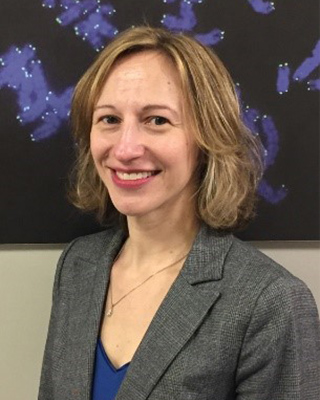
November 26, 2019
Mitchel Rosen, Ph.D.
Thirty years ago, Mitchel Rosen, Ph.D., began his career as a program coordinator at the New Jersey/New York Hazardous Materials Worker Training Center (NJ/NY Worker Training Center). Today, he runs the Center, which is funded by the NIEHS Worker Training Program (WTP).
November 19, 2019
Julia Brody, Ph.D.
It was over 20 years ago when NIEHS grantee Julia Brody, Ph.D., first started receiving phone calls from study participants asking for their results. Ever since, she has dedicated her career to results report-back, a practice that ensures individuals and communities that are part of environmental health studies have access to their results and information on what they mean for their health.
November 13, 2019
Christopher Bradfield, Ph.D.
NIEHS grantee Christopher Bradfield, Ph.D., professor of oncology in the McArdle Laboratory for Cancer Research at the University of Wisconsin-Madison, has built a research program funded by the NIEHS for over 20 years. Bradfield and his research team have made groundbreaking discoveries about PAS proteins, a special class of proteins that act as environmental sensors for light, oxygen, and foreign substances in a variety of species.
October 30, 2019
Sudipto Banerjee, Ph.D.
Sudipto Banerjee, Ph.D., can model how pollution moves across entire continents, how trees grow in different climates, and how exposures affect human health.
October 25, 2019
Cesar Bandera, Ph.D.
NIEHS grantee Cesar Bandera, Ph.D., an electrical engineer, business owner, and professor of entrepreneurship, develops technologies for public and environmental health. He is an advocate for the NIEHS Small Business Innovation Research (SBIR) Program, which encourages small businesses to bring technology solutions to market through translational research.
October 18, 2019
Margaret Mellecker
Margaret Mellecker is applying her diverse career experiences to educate and protect workers across the country. With a background in mechanical engineering and a secondary teaching certificate, Mellecker is comfortable in the field and in the classroom, making her uniquely positioned to train workers.
October 4, 2019
Michael Yaffe, M.D., Ph.D.
Michael Yaffe, M.D., Ph.D., studies how cells respond to stress and injury, including damage from environmental pollutants. His research is revealing important protein interactions that help explain why some cells repair cell damage while others end up with chronic and persistent inflammation and increased risk for cancer.
October 3, 2019
Patricia Opresko, Ph.D.
Patricia Opresko, Ph.D., is developing cutting-edge technologies that cross scientific disciplines to study DNA damage and repair in telomeres. Telomeres are protective segments at the ends of each strand of DNA, like caps on the end of shoelaces, that get shorter with aging and contribute to uncontrolled growth of cancer cells.
September 26, 2019
Carol Rice, Ph.D.
NIEHS grantee Carol Rice, Ph.D., industrial hygienist and professor emerita of environmental health at the University of Cincinnati, is one of several experts who helped grow a tradition of worker health and safety training programs in the Midwest.
September 19, 2019
Trey Ideker, Ph.D.
Trey Ideker, Ph.D., uses systems biology approaches to understand the many pathways underlying complex biological processes. According to Ideker, these approaches can be used to predict how certain exposures lead to disease, how diseases will progress, and what treatment options may be most successful.
August 13, 2019
Johnnye Lewis, Ph.D.
Longtime NIEHS-funded researcher Johnnye Lewis, Ph.D., is passionate about understanding how toxic metals in mining waste impact Native American communities and discovering solutions to protect their health. Lewis’ diverse background in pharmacology, toxicology, and physiology, along with her long history of working with tribal communities near abandoned mining sites, inspired her to begin the Community Environmental Health Program at the University of New Mexico (UNM) in 1996.
June 18, 2019
Gregory D. Sempowski, Ph.D.
Gregory D. Sempowski, Ph.D., is dedicated to helping workers protect themselves during infectious disease emergencies. He leads the Duke Infectious Disease Response Training (DIDRT) program, a five-state consortium funded by the NIEHS Worker Training Program (WTP), to provide up-to-date, high-quality, effective, and efficient biosafety and infectious disease response training.
April 26, 2019
John LeConche
John J. LeConche has dedicated his career to public health and protecting workers by developing and delivering training to diverse industry sectors. He serves as executive director of LIUNA Training and Education Fund (LIUNA Training), the training arm for the Laborers' International Union of North America (LIUNA).
March 26, 2019
Mark Zylka, Ph.D.
Mark Zylka, Ph.D., professor of cell biology and physiology at the University of North Carolina, Chapel Hill (UNC), uses cell cultures and mouse models to study the role of genetics and environmental factors in brain disorders.
March 14, 2019
Lisa McCormick, Dr.P.H.
Lisa McCormick, Dr.P.H., has been working on emergency response and public health preparedness her whole career. She is co-director of the University of Alabama Birmingham (UAB) Deep South Biosafety Consortium, which is funded by the NIEHS Worker Training Program (WTP).
January 19, 2019
David Reif, Ph.D.
David Reif, Ph.D., is advancing what we know about the complex interactions between human health and the environment using data science. He uses a collaborative, team science approach to integrate data from diverse sources and analyze potential health effects of chemical exposures.to Top


